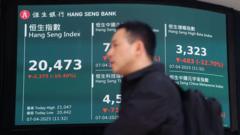Asian markets are feeling the heat from the recent US tariff announcements, with major indices suffering substantial losses as fears of a global recession loom.
**Asian Markets in Turmoil: The Impact of US Tariffs Takes Its Toll**

**Asian Markets in Turmoil: The Impact of US Tariffs Takes Its Toll**
Amid escalating trade tensions, Asian stock markets experience significant declines due to US tariffs.
Asian stock markets are witnessing a severe downturn as the effects of US President Donald Trump's newly imposed tariffs send shockwaves through the region. On Monday, major indexes from Shanghai to Tokyo and Sydney to Hong Kong saw substantial declines from their opening, with one analyst describing the situation as a "bloodbath." This instability can be attributed to the fact that many Asian nations rely on manufacturing goods sold globally, making them particularly vulnerable to changes in trade policy.
By midday on Monday, Japan's Nikkei 225 was down 6%, the ASX 200 in Australia lost 4%, while South Korea's Kospi fell by 4.7%. This downward trajectory was further exacerbated in mainland China, Hong Kong, and Taiwan as investors reacted to the substantial drops witnessed in other markets the previous Friday, coupled with public holidays in the region. The Shanghai Composite index fell more than 6%, while the Hang Seng and Taiwan Weighted Index both plunged by around 10%.
Market analysts believe that the announcement of tariffs is stoking concerns about inflation and the potential for a recession. Julia Lee, head of FTSE Russell, observed that these tariffs are impacting expectations for economic stability. Goldman Sachs has now projected a 45% chance of a recession within the next year, an increase from a prior estimate of 35%. Other financial institutions like JPMorgan have also adjusted their projections, now estimating a 60% probability of a recession affecting both the US and globally.
For Asian economies, a slowdown in the US market—a significant destination for regional exports—poses serious risks. Qian Wang, chief economist at investment firm Vanguard for Asia Pacific, warned that this new regime of tariffs would negatively impact both global and Asian economies, particularly smaller, export-reliant nations. Countries such as Vietnam and Bangladesh find themselves increasingly dependent on the US for exports, with Trump’s tariffs hitting Vietnam with a 46% rate and Bangladesh facing a 37% tariff.
This turmoil doesn't solely affect these countries directly; significant US brands, like Nike and Lululemon, rely on producing their goods in Vietnam, which will be felt in retail markets worldwide. Bangladesh, with exports of garments worth approximately $8.4 billion annually to the US, also faces major repercussions.
Historically, Asia has been more reliant on exports to the US than other markets, compounding the difficulties presented by the latest tariffs. Former Undersecretary for International Trade at the US Department of Commerce, Frank Lavin, pointed out the disproportionate impact on Asian economies.
Following the US tariff announcements, global stock markets have experienced considerable losses, with the US stock market suffering its worst week since 2020. The S&P 500 index alone fell almost 6%. In the UK, the FTSE 100 dropped nearly 5%, a decline not seen in five years, while declines in German and French exchanges mirrored these staggering losses. Analysts predict that the global market rout is likely to continue in the coming days, further amplifying the volatility.
By midday on Monday, Japan's Nikkei 225 was down 6%, the ASX 200 in Australia lost 4%, while South Korea's Kospi fell by 4.7%. This downward trajectory was further exacerbated in mainland China, Hong Kong, and Taiwan as investors reacted to the substantial drops witnessed in other markets the previous Friday, coupled with public holidays in the region. The Shanghai Composite index fell more than 6%, while the Hang Seng and Taiwan Weighted Index both plunged by around 10%.
Market analysts believe that the announcement of tariffs is stoking concerns about inflation and the potential for a recession. Julia Lee, head of FTSE Russell, observed that these tariffs are impacting expectations for economic stability. Goldman Sachs has now projected a 45% chance of a recession within the next year, an increase from a prior estimate of 35%. Other financial institutions like JPMorgan have also adjusted their projections, now estimating a 60% probability of a recession affecting both the US and globally.
For Asian economies, a slowdown in the US market—a significant destination for regional exports—poses serious risks. Qian Wang, chief economist at investment firm Vanguard for Asia Pacific, warned that this new regime of tariffs would negatively impact both global and Asian economies, particularly smaller, export-reliant nations. Countries such as Vietnam and Bangladesh find themselves increasingly dependent on the US for exports, with Trump’s tariffs hitting Vietnam with a 46% rate and Bangladesh facing a 37% tariff.
This turmoil doesn't solely affect these countries directly; significant US brands, like Nike and Lululemon, rely on producing their goods in Vietnam, which will be felt in retail markets worldwide. Bangladesh, with exports of garments worth approximately $8.4 billion annually to the US, also faces major repercussions.
Historically, Asia has been more reliant on exports to the US than other markets, compounding the difficulties presented by the latest tariffs. Former Undersecretary for International Trade at the US Department of Commerce, Frank Lavin, pointed out the disproportionate impact on Asian economies.
Following the US tariff announcements, global stock markets have experienced considerable losses, with the US stock market suffering its worst week since 2020. The S&P 500 index alone fell almost 6%. In the UK, the FTSE 100 dropped nearly 5%, a decline not seen in five years, while declines in German and French exchanges mirrored these staggering losses. Analysts predict that the global market rout is likely to continue in the coming days, further amplifying the volatility.




















